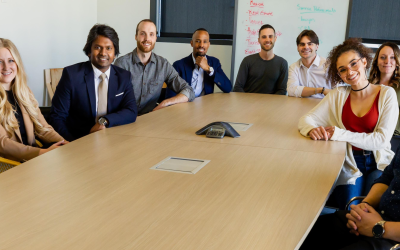Tips to Manage Change in the Workplace
Every organisation will change at one point or another. Employees may not receive these changes well. Change is inevitable for an organisation to develop its business and exhibit rapid growth. As an employer, you must help employees manage change in the workplace.
It is essential to understand the impact a change in the workplace can have on employees’ lives. The difference can cause stress for some employees.
Some organisations might undergo constant change. In such cases, the employers should develop ways to ensure that the change does not affect the employees in any way. A smooth transition is necessary, and employers should offer courses to help employees adapt to the changes in the office.
Employees also must ensure that they handle the change positively and seek help from the organisation when needed. This can help them overcome hurdles in the workplace so they can thrive in their job.
Abrupt changes in the workplace can bring down the productivity of employees. Changes in the workplace can vary to a great extent. It can either be a manageable change or a drastic change that makes it difficult for employees to work.
The following tips can help employees handle workplace changes and ensure that they are more manageable.
Managing Change in the Workplace for Employers
Employers are the ones who bring about change in the workplace. Their responsibility is to make sure that the transitions are seamless so they can get the most out of their business by keeping their employees satisfied.

-
Provide a Clear Plan
Change in the workplace is pervasive. Creating a difference in the workplace without a plan can prove inefficient. The change must have a clear vision, a path to achieve it, an expected deadline, and indicators for a successful transition. This will help ensure that the business is moving in the right direction. Only when your employees understand the plan can they have a proper indication of their role in the change.
-
Set the Expectations
Change is necessary, but it is essential to give employees the proper expectations of the coming change. It is required to define the change in your workplace and how it affects the regular duties of your employees. Define the changes at various stages of the transition. This can help employees understand what to expect and how to handle them as they come up in the workplace.
-
Create New Performance Indicators
When there is a change in the workplace, it alters the entire dynamics of the employees’ work. In such cases, the chances are that the employers cannot track the performance of the employees by using the old metrics. The new change often requires the employees to come up with a different set of performance indicators to track the employees’ progress. Seek feedback from the employees about this so a new perspective is thrown toward the new performance indicators.
-
Talk about the Pros and Cons
An important part of managing change in the workplace is the transparency of the said change. Every change brings a new set of opportunities and challenges to the organisation. The employees must understand both the pros and cons of the coming changes. That may help to keep them prepared, but it may also ensure that they also understand the problems that can come with the changes. Understanding them can help them weigh the pros and cons and keep them going through a tough time.
Managing Change in the Workplace for Employees
The employers can only help to a certain extent. Changes in the workplace are common, and handling them to a certain extent is a skill that every employee should possess.
-
Maintain Old Relationships
In the workplace, employees might have forged relationships. These relationships should not be forgotten when the change takes place. Maintain old relationships, even if you have a new team and different co-workers working alongside. This can help give you a sense of familiarity with the changing times. Keeping in touch with old colleagues can improve your employees’ morale and help them tackle changes better.
-
Help Your Co-Workers
Managing change in the workplace can get quite tiresome. This need not be the case. Your peers might feel the same. Talk with them and help them overcome their challenges. Sometimes, even if you can offer no proper solutions, it is better to have someone to talk with. Helping your peers may also, in a way, help you handle the stress that comes with change.
-
Communicate Frequently
Good communication can help you to manage changes in the workplace. Co-workers and managers can only help you with your issues if you communicate with them. Your problems and anxiety can be addressed only when you express them to the organisation.
-
Embrace the Change
New changes in the organisation come with new opportunities. Use this to your advantage and improve your skills. When change is inevitable, it is unhealthy to resist it. This will only prove to be counterproductive to your desired work life. Rather than fighting it, try to acknowledge the change and accept it. Challenge yourself to manage the changes to perform better in the changing times.
Final Thoughts
As mentioned above, change is inevitable. It is essential to handle them efficiently without causing any damage to your work life. Change comes with the opportunity for growth. Knowing and understanding this is the first step to adapting to the changes. Also, the change is on the organisational level. This means that everyone handles the changes but in a different way. Tackling the change together can benefit everyone in the organisation.
LogicMelon
Award-winning recruitment software that will find, attract, hire and analyse the way you want to work. At LogicMelon, we have experienced software recruitment marketing specialists to help you build effective recruitment solutions supported by the best customer service you’ll find anywhere!
Email: sales@logicmelon.com or call LogicMelon (UK) +44 (0) 203 553 3667 (USA) +1 860 269 3089
Cultural Differences and How to Identify Them in Global Teams
Understanding cultural differences is integral to managing a diverse team and for people to conduct themselves with cultural values.
Group Dynamics: Definition, Stages and Features
Group dynamics enhance teamwork, they plan tasks in such a way that they work towards a common objective. Read this blog to know more.
Challenges That Every Business Faces With Deskless Workers
Deskless workers are employees who do not have a designated workspace. They are becoming a permanent fixture in the workforce.


